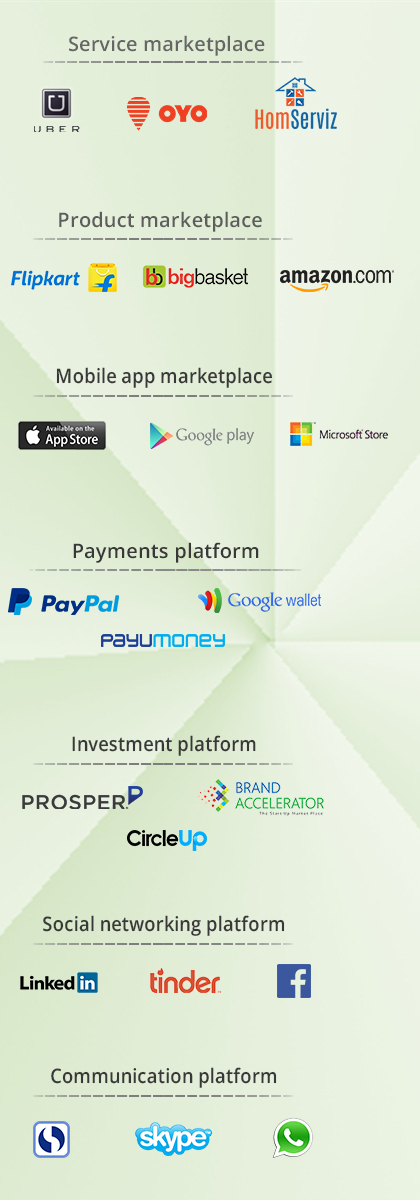Quick Overview of PBBM:
Platform based business model is a customer-centric business model that facilitates the trading or exchange of products or services between two or more interdependent groups, usually consumers and producers (or sellers). The interdependent groups may be either B2B or B2C.
Types of PBBM:
There are a variety of platforms that allows one to exchange goods, services, contents, and investment with or without money. The prominent platform based business models and examples to that include:

• Service marketplace: Uber, Oyo Rooms, HomServiz
• Product marketplace: Flipkart, Amazon, Big Basket
• Mobile app marketplace: App Store, Play Store, Microsoft Store
• Payments platform: PayPal, Google Wallet, PayUmoney
• Investment platform: CircleUp, Prosper, Brand Accelerator
• Social networking platform: Facebook, LinkedIn, Tinder
• Communication platform: Skype, WhatsApp, CircleChat
Past of PBBM:
Platform based business models aren’t latest. In fact, they’re as old as human civilization itself, and they are the renewed forms of early marketplaces, bazaars and auction houses. In the past, the bazaar owner used to lease booths to merchants, where the merchants were putting their products.
Then the bazaar owner was advertising to customers to visit to the bazaar. The customers were purchasing the products or goods that merchants or producers offer. The bazaar was acting as a bridge between consumers and producers, by facilitating these exchanges.
Present of PBBM:
The earlier bazaar (marketplace) habit continued as brick-and-mortar locations like shopping mall in the 20th century, and as online marketplace like website and mobile marketplace like mobile app in the 21st century, thanks to the connected technology. The present of PBBM is prominently focused on online and mobile marketplaces, in which mobile marketplace has the upper hand.
According to a global statistics portal, there are around 1.32 billion active online buyers in the world, in which more than 60% might be buyers through mobile, where China, India, and USA top the list.
Future of PBBM:
The future of PBBM might completely be focused on mobile. Today, in the connected world, the platform based businesses built on technology are creating more value for all groups of the platform such as platform owner, buyers and sellers. In the future, the value that platform based businesses built on technology are creating today is expected to be tripled.
What is PBBM Built on Technology?
PBBM Built on Technology refers platform based business models that are focused on the internet, mobile, mobile app and other advanced technological solutions to execute or facilitate the exchange or trade. Among these, the mobile app is considered as the most effective as well as a fruitful technological solution for the platform based business model.
Which PBBM to Choose?:
FuGenX’s Solution (suggestion) to Choose Right PBBM:
FuGenX first clarifies the platform is a business model, not a technology. People often get confused that the mobile app or website is a platform, but they are wrong. The mobile app is a technological solution that makes the exchange or trade easier and effective than any other technological or traditional solution or method.
Mobile app is why the most effective and easier because it enables on-the-go access to the platform, enriches the customer experience, engages them better as well as cost-effective in the long run. FuGenX suggests you to choose a PBBM that is technology-driven, customer-focused, responsive to the latest trend, and demanding in both present and future.
Conclusion:
The concept of the present platform based business model is same as in the past and even it would be same in the future, but the difference is technology and the differentiator is mobile technology.
